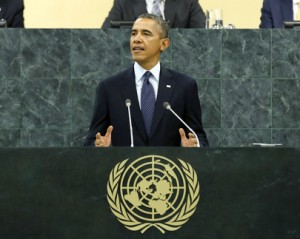
President Barack Obama speaking to the United Nations General Assembly on Sept. 24, 2013. (UN photo)
If President Barack Obama is right about the revived hopes for settling several interlocking crises in the Middle East -- from Iran's nuclear program to the Israel-Palestinian conflict -- a good starting place would be a decision by the various sides to lift the curtains of unnecessary secrecy surrounding both current events and their historical context.
But the key actors in these geopolitical dramas can't seem to shake their addiction to secrecy. For instance, on the historical front, Iran and Russia -- as well as Israel and the U.S. intelligence community -- have evidence about alleged Republican-Iranian interference in President Jimmy Carter's hostage negotiations with Iran in 1980, but this material is still kept hidden.
In 1993, the Russian government supplied a U.S. congressional task force with a secret summary of Soviet-era intelligence information corroborating the allegations of a Republican-Iranian deal, but the summary contained few details about Moscow's proof and there was no serious U.S. follow-up of the disclosure with Russian officials. Israel allegedly helped implement the brokered deal by becoming Iran's weapons supplier in the early 1980s. Over the years, key Iranians, including former President Abolhassan Bani-Sadr, have declared that a secret deal was struck with Ronald Reagan's presidential campaign to delay the release of 52 American hostages in Iran until after the U.S. election to guarantee Carter's defeat. But the Iranian government has kept officially mum on its role in the so-called October Surprise case.
The U.S. intelligence community presumably has October Surprise information, too, although when the congressional task force sought it in 1992 the CIA director was Robert Gates, one of the CIA officers implicated in the 1980 operation. He had been installed at the head of the intelligence community in 1991 by President George H.W. Bush, another suspect. So, it probably should have come as no surprise that Gates, the CIA and Bush's White House dragged their feet on document production in 1992.
So, as a show of good faith now, the various players could stop playing games and open up their archives to finally resolve this nagging historical mystery. Some Republicans might even think better of the Iranians if they knew that Ayatollah Ruhollah Khomeini helped install their hero, Ronald Reagan, in the White House.
Other Americans might see it as a case of geopolitical karma: the United States secretly undermined Iran's democracy in 1953 and the Iranians returned the favor to the United States in 1980. Just recently, the U.S. government confirmed that the CIA, indeed, had organized a coup d'etat against the elected Iranian government of Prime Minister Mohammad Mossadegh in 1953, installing the autocratic Shah of Iran who governed Iran harshly until 1979.
The Iranians could now show their appreciation for that belated U.S. admission by disclosing whatever evidence they have about Republican double-dealing during the 1980 hostage crisis. Whatever those facts may show, the truth could clear the air -- and establish some trust -- as the United States and Iran grapple with how to resolve the current dispute over Iran's nuclear program. [For the latest and most detailed account of the October Surprise evidence, see Robert Parry's America's Stolen Narrative.]
No Stonewall on Syrian Case
On a more current topic -- the question of who was behind the chemical weapons deaths outside Damascus, Syria, on Aug. 21 -- government claims of secrecy also should be dropped and all pertinent evidence should be presented to the world.
The Russians have a 100-page report purportedly clearing the Syrian government but they haven't made it public. The Obama administration claims to have physical evidence proving the Syrian government's guilt but won't release it, either. Instead, President Obama and Secretary of State John Kerry seem committed to a strategy of simply de-legitimizing any doubts that Syrian President Bashar al-Assad is guilty.
On Aug. 30, the Obama administration released a four-page "Government Assessment" that asserted the Syrian government's guilt without presenting any evidence at all. The white paper was palmed off as an "assessment" from the U.S. intelligence community but it really was posted on the Internet by the White House press office.
In a pattern reminiscent of George W. Bush's phony case for war with Iraq in 2002-2003, U.S. journalists and politicians quickly recognized that their career prospects were brightened if they joined the anti-Assad stampede and darkened if they got in the way.
Then, the 38-page report issued by United Nations inspectors last week presumably sealed the deal on Assad's guilt, as major U.S. news outlets extrapolated from evidence in the report to conclude that the attack must have been launched by Syrian government forces intimately connected to protecting Assad.
Though the actual facts in the UN report were much murkier -- including the absence of any chemical weapons agents at one site and inspectors' warnings that the evidence at the second site may have been manipulated -- the U.S. news media brushed past those concerns and marched in lockstep with Secretary Kerry and President Obama.
Everyone, it seemed, knew that only Assad apologists and crazies would continue harboring doubts. Secretary Kerry declared as much when he announced that he would not let the UN get bogged down in a debate over the guilt of the Syrian government. "We really don't have time today to pretend that anyone can have their own set of facts," he said in a slap at the Russians.
President Obama reinforced the point in his address to the UN General Assembly on Tuesday: "It's an insult to human reason and to the legitimacy of this institution to suggest that anyone other than the regime carried out this attack."
(Note: You can view every article as one long page if you sign up as an Advocate Member, or higher).





